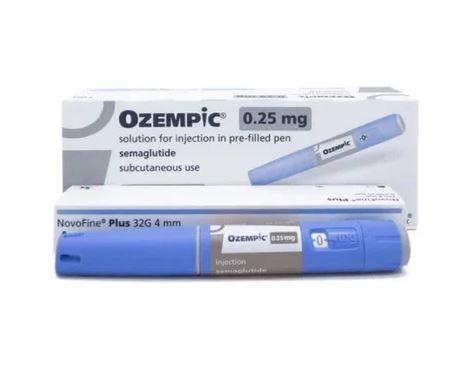Antibiotics and Alcohol Interaction
Combining alcohol and antibiotics might be risky. Doctors advise against drinking while using a variety of medications. The main concern is that mixing antibiotics and alcohol might make dangerous side effects more likely. The specific side effects that an antibiotic can cause depend on the drug. However, some common side effects of antibiotics include nausea, sleepiness, dizziness, lightheadedness, and diarrhea.
In most cases, consuming alcohol won’t stop your antibiotic from treating your infection. However, it can still obstruct your infection’s recovery in other ways. Getting adequate sleep and eating well will aid in your recovery from an illness or infection, but alcohol use can affect these factors. Alcohol might also hinder your body’s ability to absorb essential nutrients. Your blood sugar levels may rise, and your energy levels may decline.
What are Antibiotics? Effects of Alcohol and Antibiotics
Antibiotics are medicines that fight bacterial infections in people and animals. They work by killing the bacteria or making it hard for them to grow and multiply [1]. Antibiotics only treat certain bacterial infections, such as strep throat, urinary tract infections, and E. coli. You may not need to take antibiotics for some bacterial infections. For example, you might not need them for many sinus or ear infections. Taking antibiotics when they’re not needed won’t help you, and they can have side effects and contribute to antibiotic resistance. Antibiotic resistance happens when the bacteria change and can resist the effects of an antibiotic [2]. This means that the bacteria continue to grow.
Antibiotics can be taken in different ways:
- Orally (by mouth). This could be pills, capsules, or liquids.
- Topically. This might be a cream, spray, or ointment on your skin. It could also be eye ointment, eye drops, or ear drops.
- Through an injection or intravenously (IV). This is usually for more severe infections.
Can You Take Antibiotics and Drink Alcohol?
Combining antibiotics and alcohol will not usually lower your antibiotic’s effectiveness, but it may cause side effects and hinder your body’s natural ability to heal itself. Drinking alcohol while fighting an infection can lead to upset stomach dehydration, lower your immune response, and interrupt normal sleep. Some antibiotics can also be dangerous for your liver, so you must check with your doctor or pharmacist before mixing antibiotics and alcohol.
When the body breaks down alcohol, it produces acetaldehyde, which can cause nausea. Many people taking antibiotics already experience stomach or digestive side effects, and drinking alcohol while on these medications can increase feelings of nausea. In addition to gastrointestinal issues, both antibiotics and alcohol can hinder cognitive function, concentration, and coordination. Another thing to consider with antibiotics and alcohol is that drinking interferes with the body’s essential processes, like hydration and sleep, and these are critical components of recovering from a bacterial illness. Due to these factors, it’s best to stay away from alcohol for the duration of antibiotic treatment.
Antibiotics and Alcohol Myth
What is the alcohol and antibiotics myth? Staying off alcohol when taking prescription antibiotics has been advised by doctors, pharmacists, and well-meaning relatives for decades. This advice may have originated in the 1950s when penicillin became the first effective treatment for sexually transmitted infections (STIs) such as gonorrhea and syphilis.
Doctors were worried that alcohol intoxication could undo their expensive treatment with the new miracle drugs. So, patients were advised to abstain from alcohol until things cleared up. This may be well-founded because patients receiving penicillin for STD (sexually transmitted disease) at that time were more likely to engage in risky sexual activity while intoxicated.
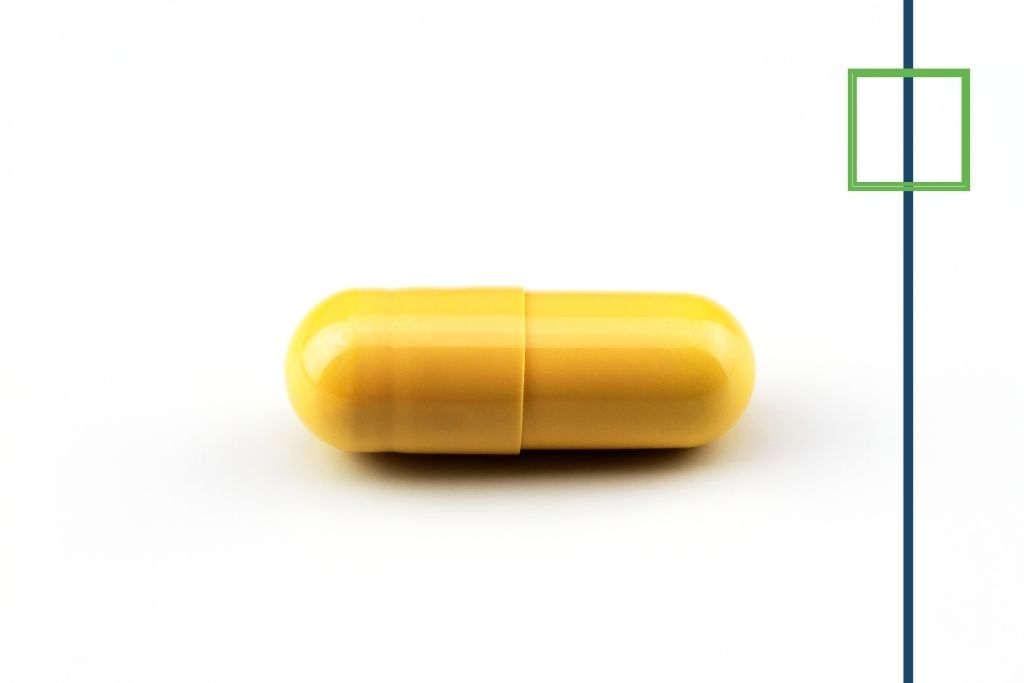
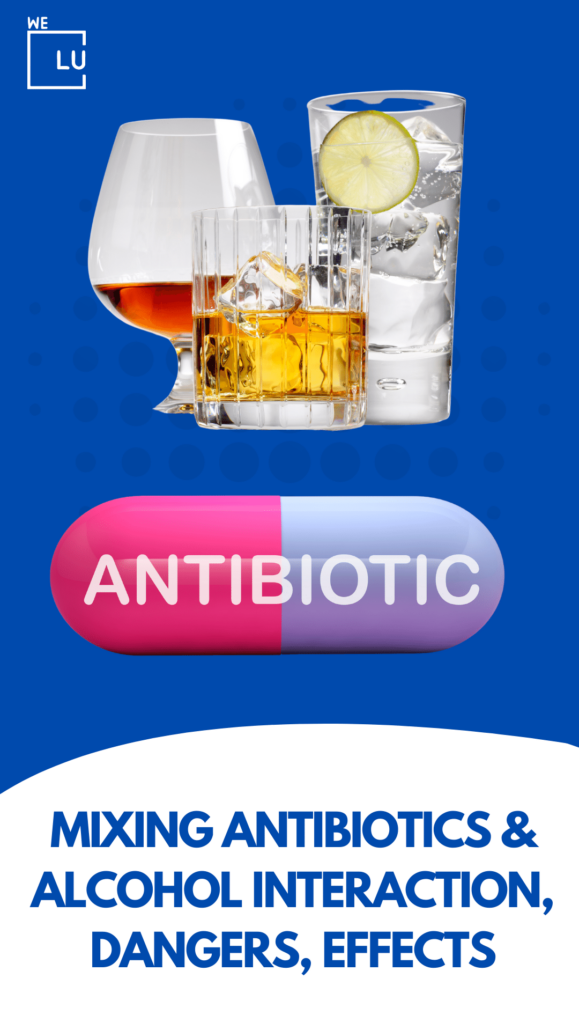
Skip To:
Learn More:
The advice that you shouldn’t mix antibiotics and alcohol does hold for a small group of anti-infective drugs, including metronidazole (Flagyl, Metronide, or Metrogyl), tinidazole (Fasigyn or Simplotan), and sulfamethoxazole/trimethoprim (Bactrim, Co-trimoxazole).
These antibiotics block one of the significant pathways that metabolize alcohol and cause a rapid build-up of acetaldehydes, which are responsible for many of the uncomfortable physical effects of hangovers. You can be red-faced, fainting, and vomiting with these drugs after as little as one glass of beer.
For nearly all other types of antibiotics, there is no clear evidence of harm from moderate alcohol intake. This is where the antibiotic and alcohol myth came from. But this doesn’t mean it’s a good idea to drink to excess when you’re in the grip of an infection, as the nauseating and sedative effects of the alcohol are likely to increase if you battle infections.

Get Your Life Back
Find Hope & Recovery. Get Safe Comfortable Detox, Addiction Rehab & Mental Health Dual Diagnosis High-Quality Care at the We Level Up Treatment Centers Network.
Hotline (877) 378-4154Antibiotics and Alcohol Effects Drug Facts
Dangers of Alcohol Consumption and Antibiotics
Antibiotics and alcohol seldom mix well together. Your body can experience side effects from both alcohol and antibiotics, and consuming alcohol while taking antibiotics increases your likelihood of experiencing these negative consequences.
If the label on your drug says not to drink alcohol during treatment, follow that advice.
Remember that short-term antibiotic prescriptions are common. Think about delaying your next drink until you are no longer taking your meds. It could lessen the possibility of difficulties or adverse effects from using antibiotics.
Avoiding alcohol will likely help you get over your infection more quickly anyway.
Talk with your doctor and pharmacist if you’re taking an antibiotic. They can talk to you about alcohol use and your medications.
When to Contact a Medical Professional
Alcohol poisoning is a serious — and sometimes fatal — consequence of drinking large amounts of alcohol in a short period of time. Drinking too much too quickly can affect your breathing, heart rate, body temperature, and gag reflex and potentially lead to a coma and death.
See your provider if you or someone you know has symptoms of alcohol poisoning. You can also call 911 or the local emergency number or go to the hospital emergency room. DO NOT delay.
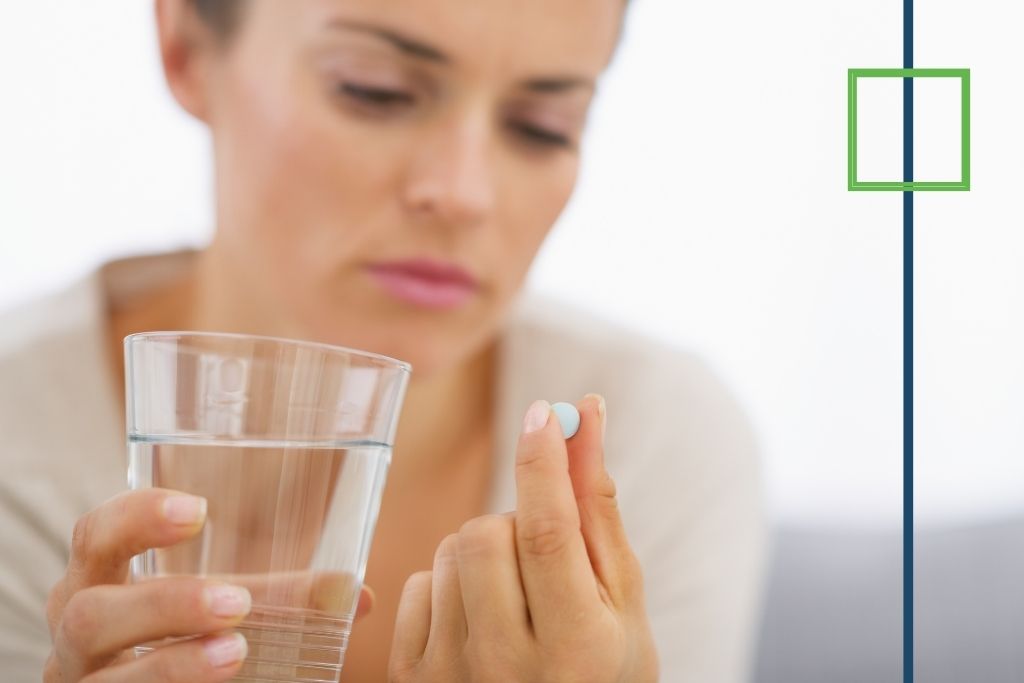
Alcohol Use Facts & Resources Fact Sheet Made Publicly Available by Substance Abuse & Mental Health Services Administration (SAMHSA)
Alcohol and Antibiotics Interaction & Statistics
Are you planning to drink alcohol and antibiotics? Mixing prescription drugs, such as antibiotics and alcohol, can be harmful. Alcohol, like some medicines, can make you drowsy, sleepy, or lightheaded. Mix alcohol and antibiotics, and they can intensify these effects. You may have trouble concentrating or performing mechanical skills. Small amounts of alcohol can make driving dangerous, and when you combine UTI antibiotics and alcohol, or even amoxicillin antibiotics and alcohol, you put yourself at even greater risk.
11,616
Over 5,000 people aged 65 and above in the U.S. died of a drug overdose in 2020, and more than twice that many (11,616) died of alcohol-induced causes.
Source: CDC
85,688
In 2019, of the 85,688 liver disease deaths among individuals ages 12 and older, 43.1% involved alcohol.
Source: CDC
40%
About 40% of individuals who know they have an alcohol or drug problem are not ready to stop using, and many others feel they do not have a problem or need treatment.
Source: CDC
Get Help. Get Better. Get Your Life Back.
Searching for Accredited Drug & Alcohol Rehab Centers Near You? Or Mental Health Support?
Even if you have failed previously, relapsed, or are in a difficult crisis, we stand ready to support you. Our trusted behavioral health specialists will not give up on you. Call us when you feel ready or want someone to speak to about therapy alternatives to change your life. Even if we cannot assist you, we will lead you wherever you can get support. There is no obligation. Call our hotline today.
FREE Addiction Hotline – Call 24/7Mixing Antibiotics and Alcohol Interaction Infographic
The effectiveness of your antibiotic will not typically be decreased by combining it with alcohol. Still, it may have undesirable side effects and interfere with your body’s ability to heal itself.
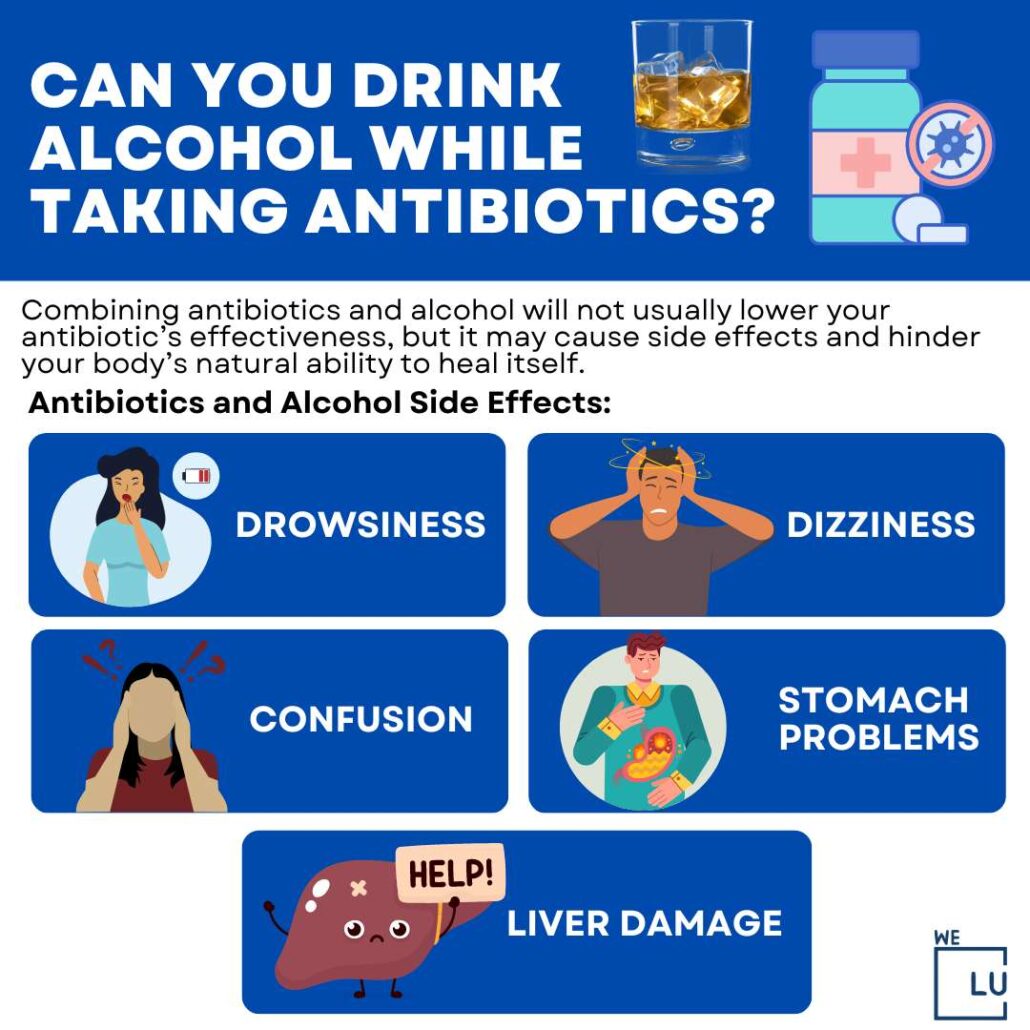
Embed the above “Can You Drink Alcohol While Taking Antibiotics?” Infographic to your Website. This infographic is provided by the We Level Up Addiction Treatment Center team. To use the above infographics, you agree to link back and attribute its source and owner at https://welevelupnj.com/addiction/antibiotics-and-alcohol/
Can You Drink Alcohol While Taking Antibiotics? image link: https://welevelupnj.com/wp-content/uploads/2023/04/Can-You-Drink-Alcohol-While-Taking-Antibiotics-1030×1030.jpg
Can You Mix Antibiotics and Alcohol?
Antibiotics and alcohol have individual side effects that impact an individual’s mental and behavioral state. Because of this, the two should never be combined. A handful of antibiotics can cause violent physical reactions when combined with alcohol. These include Metronidazole and Linezolid, which are commonly prescribed to treat intestinal tract and skin infections, and the sulfonamide medications of Sulfamethoxazole and Trimethoprim (Bactrim), which are used to treat everything from urinary tract infections to pneumonia to ear infections.
Consuming alcohol while taking these drugs can result in severe fatigue, throbbing headaches, dizziness, anxiety, chest pain, and heart palpitations. Alcohol can also worsen digestive side effects and turn into blood or mucus in stool, severe diarrhea, intense stomach cramping or pain, fever, and uncontrollable vomiting. Mixing alcohol with certain antibiotics can also damage vital organs, including the liver. The kidneys are responsible for removing toxins, including medications, from the blood and body through urine. Antibiotics can overburden and damage kidneys, and alcohol exacerbates this.
In addition to all of the debilitating side effects detailed above, alcohol can hinder specific immune system processes and hurt the body’s ability to recover from an infection. Alcohol slows the healing process and recovery time and puts an individual at increased risk of developing another infection.
The Effects of Mixing Antibiotics and Alcohol
Combining antibiotics and alcohol can damage your organs. Both antibiotics and alcohol burden the liver and kidneys. Alcohol can also compromise the body’s immune system responses affecting the body’s recovery. Besides slowing down the healing process, alcohol can put a person at risk of getting new infections.
Many antibiotics are known to cause violent reactions when taken alongside alcohol. These reactions range from vomiting and nausea to dizziness, headaches, chest pains, anxiety, and heart palpitations.
These symptoms match those of alcohol intolerance caused by medication like disulfiram (Antabuse medication) prescribed to individuals with alcohol addiction problems.
Below we have listed the names of antibiotics that you should strictly avoid alcohol while continuing the course of medication. These include:
- Tetracyclines: Alcohol should be avoided when taking antibiotics like tetracyclines like doxycycline and minocycline because doxycycline reduces the effectiveness of antibiotics and minocycline can increase liver disease risks

- Oxazolidinones: Oxazolidinones like Linezolid shouldn’t be mixed with alcohol because it can cause fever, agitation, rapid heartbeat, unusual sweating, rapid breathing, vomiting, elevated blood pressure, seizures, abnormal heart rhythm, coma, cardiorespiratory depression, muscle spasms, muscle rigidity, and altered mental status
- Sulfonamides: Sulfonamides like trimethoprim and sulfamethoxazole shouldn’t be mixed with alcohol to avoid side effects like a folic acid deficiency
- Fluoroquinolones: Fluoroquinolones like levofloxacin and ciprofloxacin can cause confusion, nervousness, agitation, memory loss, disorientation, and attention disturbances when mixed with alcohol. The effects are, however, pronounced with high alcohol consumption
- Nitroimidazoles: Nitroimidazoles, like metronidazole, can cause headaches, facial flushing, nausea, vomiting, and abdominal cramping when mixed with alcohol. You shouldn’t take alcohol for 3 days after your last dose of Nitroimidazoles.
First-class Facilities & Amenities
World-class High-Quality Addiction & Mental Health Rehabilitation Treatment
Rehab Centers TourRenowned Addiction Centers. Serene Private Facilities. Inpatient rehab programs vary.
Addiction Helpline (877) 378-4154Proven recovery success experience, backed by a Team w/ History of:
15+
Years of Unified Experience
100s
5-Star Reviews Across Our Centers
10K
Recovery Success Stories Across Our Network
- Low Patient to Therapist Ratio
- Onsite Medical Detox Center
- Comprehensive Dual-Diagnosis Treatment
- Complimentary Family & Alumni Programs
- Coaching, Recovery & Personal Development Events
Antibiotics and Alcohol Side Effects
Alcohol is also considered a central nervous system (CNS) depressant. Some antibiotics, like metronidazole (Flagyl), may also lead to CNS side effects such as:
- Drowsiness
- Sedation
- Dizziness
- Confusion
When alcohol is combined with antibiotics that also have a CNS depressant effect, additive effects may occur. These effects can be severe when driving or operating machinery, in the elderly, and in patients who may take other depressant CNS medications, such as opioid pain relievers, muscle relaxants, antidepressants, and anxiety or seizure medications.
Stomach side effects
Stomach problems, such as nausea, vomiting, diarrhea, and stomach pain, can be expected with antibiotics, too. Consuming alcohol can worsen these stomach side effects.
Liver damage
Excessive alcohol use is well-known to cause liver damage like cirrhosis. Taking antibiotics that can also damage the liver may worsen these problems.
Mixing Alcohol and Antibiotics. The Main Effect of Antibiotics and Alcohol.
Usually, alcohol does not affect how well an antibiotic fights infection. However, the combination may produce unpleasant side effects. Also, in some circumstances, levels of a drug in your bloodstream might be changed, which may affect its effectiveness.
Alcohol is broken down (metabolized) in the liver extensively by enzymes. The same or similar enzymes also metabolize some drugs. Depending upon how much and how often alcohol is consumed, changes in these enzymes may alter how drugs are metabolized in your body. For example:
- When an intoxicating, acute amount of alcohol (large amount over a short period) is consumed, certain enzymes do not work as well to break down the drug for metabolism. The levels of the antibiotic in the body may increase because it is not fully metabolized and excreted, which could lead to more significant drug toxicity and side effects.
- Alternatively, when alcohol is used daily (chronically), enzyme levels can be “induced.” This means the drug is being broken down more quickly in the body, and the levels of antibiotics in the blood may decrease. Your infection may not be cured, and antibiotic resistance may occur, too.
World-class, Accredited, 5-Star Reviewed, Effective Addiction & Mental Health Programs. Complete Behavioral Health Inpatient Rehab, Detox plus Co-occuring Disorders Therapy.
CALL (877) 378-4154End the Addiction Pain. End the Emotional Rollercoaster. Get Your Life Back. Start Drug, Alcohol & Dual Diagnosis Mental Health Treatment Now. Get Free No-obligation Guidance by Substance Abuse Specialists Who Understand Addiction & Mental Health Recovery & Know How to Help.
Treatment for Misusing Antibiotics and Alcohol Consumption. Alcohol Use Disorder Treatment
Most individuals can avoid alcohol for a few days or weeks while on antibiotics or other medications that may interact poorly with alcoholic drinks. However, some cannot stop abusing alcohol. According to the Substance Abuse and Mental Health Service Administration (SAMHSA), substance use disorder is marked by a person who uses drugs or alcohol in a way that clinically impairs some aspect of their life.
This might include behavior that damages their home life, social life, education, work, or physical or emotional health. This behavior is a sign that you need help. At its most severe, it can represent serious alcohol addiction, which has many dangers. If you can’t stop drinking while on antibiotics, it’s a clear red flag that you need treatment.
First, make your doctor aware of this fact. It can be dangerous if a doctor prescribes antibiotics or other medication without knowing you have a problem with alcohol abuse. They can potentially give you a medication that interacts less strongly with alcohol. They can also advise you on the best path to deal with your alcohol abuse issue. Generally, some form of alcohol addiction treatment will be recommended.
Mixing antibiotics and alcohol can be risky. Not only can alcohol interact badly with some medications and cause severe side effects, but it can also potentially interrupt the natural healing process. Alcohol should be avoided until the regimen of antibiotics is completed and your body receives adequate rest and nutrition. However, if you’re someone who suffers from alcoholism, this may be easier said than done. If you think that you may be addicted to alcohol, contact We Level Up NJ to get started on the road to recovery today.

Top 5 Antibiotics and Drinking Alcohol FAQs
-
Can you drink alcohol and take antibiotics?
Even though moderate alcohol use doesn’t affect most antibiotics’ efficacy, it can lower your energy and slow your recovery from sickness. Therefore, abstain from drinking until you have finished your antibiotics and feel better.
-
Can you take antibiotics and drink alcohol?
No. Alcohol might interfere with the body’s natural healing process in addition to negatively interacting with some drugs and having significant adverse effects.
-
Can you mix alcohol and antibiotics?
No. Alcohol should be avoided until your antibiotic treatment is finished and your body has had enough rest and nutrients.
-
Can you drink alcohol while on antibiotics and steroids?
No. Long-term steroid use causes damage to the liver and kidneys, two organs that extensive antibiotics and alcohol consumption can damage.
-
Is it safe to combine alcohol and antibiotics?
No. Drinking alcohol while taking antibiotics can be risky. Mixing alcohol and antibiotics can exacerbate the side effects of some antibiotics, like drowsiness, nausea, and dizziness.
Experience Transformative Recovery at the We Level Up Treatment Center.
See our authentic success stories. Get inspired. Get the help you deserve.



Start a New Life
Begin with a free call to an addiction & behavioral health treatment advisor. Learn more about our dual-diagnosis programs. The We Level Up treatment center network delivers various recovery programs at each treatment facility. Call to learn more.
- Personalized Care
- Caring Accountable Staff
- World-class Amenities
- Licensed & Accredited
- Renowned w/ 5-Star Reviews
We’ll Call You
Search We Level Up NJ Antibiotics and Alcohol Detox, Mental Health Topics & Resources
Sources
[1] Antibiotics – U.S. Department of Health and Human Services National Institutes of Health
[2] Antibiotic Use Questions and Answers – (CDC) Centers for Disease Control and Prevention
[3] Mental Health and Substance Use Disorders – (SAMHSA) Substance Abuse and Mental Health Services Administration
[4] Nehring SM, Freeman AM. Alcohol Use Disorder. [Updated 2022 Jul 31]. In: StatPearls [Internet]. Treasure Island (FL): StatPearls Publishing; 2022 Jan-. Available from: https://www.ncbi.nlm.nih.gov/books/NBK436003/
[5] Kranzler HR, Soyka M. Diagnosis and Pharmacotherapy of Alcohol Use Disorder: A Review. JAMA. 2018 Aug 28;320(8):815-824. DOI: 10.1001/jama.2018.11406. PMID: 30167705; PMCID: PMC7391072.
[6] LaHood AJ, Kok SJ. Ethanol Toxicity. [Updated 2022 Mar 18]. In: StatPearls [Internet]. Treasure Island (FL): StatPearls Publishing; 2022 Jan-. Available from: https://www.ncbi.nlm.nih.gov/books/NBK557381/
[7] Understanding Alcohol Use Disorder – National Institute on Alcohol Abuse and Alcoholism (NIAAA)
[8] Surgeon General’s Report on Alcohol, Drugs, and Health Executive Summary
[9] Alcohol & Substance Misuse – Centers for Disease Control & Prevention (CDC)
[10] Drinking too much alcohol can harm your health. Learn the facts – Centers for Disease Control & Prevention (CDC)





